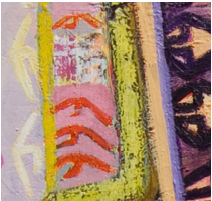Words do not undertand whats going on: Ethical-political dilemmas in the construction of an anthropological investigation

Published 2019-06-30
Keywords
- Tensiones ético-políticas,
- mujeres migrantes,
- representación,
- militancia
- Ethical-political dilemmas,
- migrant woman,
- representation,
- militancy
How to Cite
Abstract
This article seeks to approach ethical-political tensions that emerged from a specific anthropological investigation process, proposing an open reflection about the representations we create from anthropology about the people we work with (specially taking into account the power we as investigators have to allow some voices either to speak or to silence) and the impacts or effects this representations generate when published or spread among different publics. This work is framed in the final assignment proposed by the course Seminario de Ética y Derechos Humanos en la Investigación Antropológica and is related to the researches I have been carrying out in the areas of gender and migrations, together with migrant woman who have been arriving Uruguay in recent years. The tensions I seek to approach may be settled within the anthropological historical dilemma about the representations of the other, and, at the same time, from the specificity of being an investigation traversed by feminism and militancy.
Downloads
References
Fonseca, C. (2008, Enero/Diciembre) O anonimato e o texto antropológico: Dilemas éticos e políticos da etnografia “em casa”. En Teoria e Cultura, 2 (1), 39-53. E 2.
Fabian, J (1990) Presence and Representation: The Other and Anthropological Writing. En Critical Inquiry, 16 (4) 753-772.
Fassin, D. (2017) Hacia una ciencia social crítica. Entrevista a Didier Fassin por Ángel Aedo, Marjorie Murray y Giovanna Bacchiddu. En Andamios, 14 (34), 351-364.
Geertz (1989) El antropólogo como autor. Barcelona: Ediciones Paidós Ibérica.
Lammers, E. (2005, abril) Refugees, asylum seekers and anthropologists: the taboo on giving. En Global Migration Perspectives (29), 1-10.
Malinowski, B. (1986) Los argonautas del Pacífico occidental. Barcelona: Editorial Planeta-De Agostini.
Ossola, M. (2013, enero 21) La autoridad etnográfica interpelada. Tensiones contemporáneas sobre la(s) escritura(s) de la otredad. En Universitas humanística (75), 63-80.
Restrepo, E (2016) Etnografía: alcances, técnicas y éticas. Bogotá: Envión Editores.
Ramos, R. (2004, mayo 6) Los Yanomami en el corazón de las tinieblas blancas. En Relaciones 98, (25), 18-47
Sánchez, C. (2003) Voces y escritura: La reflexividad en el texto etnográfico. En RDTP LVIII, (1), 71-84.
Segato, R. (2004) Antropología y Derechos Humanos: alteridad y ética en el movimiento de los derechos universales. Série Antropologia.





